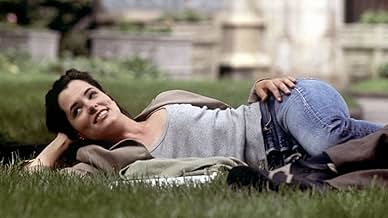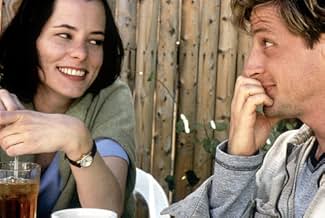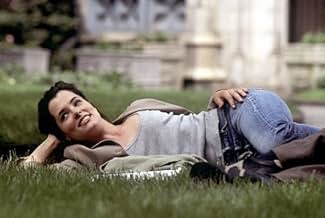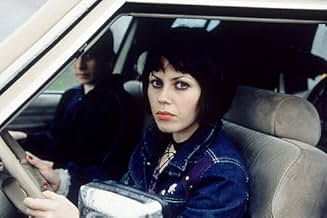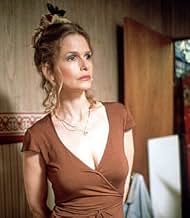AVALIAÇÃO DA IMDb
6,4/10
4 mil
SUA AVALIAÇÃO
Adicionar um enredo no seu idiomaThree women's escapes from their afflicted lives. Each struggles to flee from the men who confine their personal freedom.Three women's escapes from their afflicted lives. Each struggles to flee from the men who confine their personal freedom.Three women's escapes from their afflicted lives. Each struggles to flee from the men who confine their personal freedom.
- Prêmios
- 6 vitórias e 5 indicações no total
John Ventimiglia
- Narrator
- (narração)
Joel de la Fuente
- Thavi Matola
- (as Joel De La Fuente)
Avaliações em destaque
as you probably have heard, this is a movie that consists of three portraits. three very contrived, hard-to-watch portraits.
this movie charges out of the gate with incredible potential, including a great cast, an effective score, and nearly disorienting (yet, rather successful) camera work. additionally, at the start of the first portrait, the narrative freezes, and the narrator urges the viewer to, "wait!" so he can explain something about what's going on. this device is wonderful, and immediately gives the viewer a healthy shot of intrigue. additionally, at this point, you'll probably be really excited at the unorthodox pacing that the film seems to be setting up.
that's all in the first few minutes. and this movie literally screamed in a nosedive downward from there.
while "personal velocity" bucks conventions in many ways, it bucks the concept of storytelling so much that it is simply contrived. want to see development, plot, resolution? not here. this movie tries HARD to dodge all these things, and relentlessly starves the viewer of any of these elements with its spare dialogue.
but in the absence of these elements, what's left is - quite frankly - repetition. the characters simply keep doing what they did in the first moments of their portrait (or at least what the filmmakers set them up to do). and while they rather gratingly repeat their actions, there is no true character development.
to combat this (and surely the problem of converting short stories to film), the movie employs a narrator. this (and the repetition) is the downfall. first of all, who is the narrator? well, it's a male, which is strange since this is mainly a story about three women. ok, but why is he male? and why is he speaking so conversationally at some points? and why does he know of all these women? none of these questions are answered, and the viewer is forced to contend with this narrator who speaks incessantly throughout the entire film.
now this narrator suffers from an additional problem, which plagues the film: heavy-handedness. the narrator says things like, "she could feel the emotion like a vortex pulling her soul inward." that's actually not a direct quote, but it's very close. i am not exaggerating. at one point a character says, "you look you're waiting for something." and the narrator breaks in, "she was, she always has been." this movie can't afford such lead-weighted narration. and it certainly does not fall in line with the narrator's other parts where he's talking about how great kyra sedgewick's ass looks in jeans.
in the end, you've got however many minutes (i don't know 90ish?) of superb acting and inventive cinematography. but anchoring it down without an inch of slack to go anywhere is an overbearing narrator, and three equally overbearing and repetitious movements of what could have probably been a compelling film.
this movie charges out of the gate with incredible potential, including a great cast, an effective score, and nearly disorienting (yet, rather successful) camera work. additionally, at the start of the first portrait, the narrative freezes, and the narrator urges the viewer to, "wait!" so he can explain something about what's going on. this device is wonderful, and immediately gives the viewer a healthy shot of intrigue. additionally, at this point, you'll probably be really excited at the unorthodox pacing that the film seems to be setting up.
that's all in the first few minutes. and this movie literally screamed in a nosedive downward from there.
while "personal velocity" bucks conventions in many ways, it bucks the concept of storytelling so much that it is simply contrived. want to see development, plot, resolution? not here. this movie tries HARD to dodge all these things, and relentlessly starves the viewer of any of these elements with its spare dialogue.
but in the absence of these elements, what's left is - quite frankly - repetition. the characters simply keep doing what they did in the first moments of their portrait (or at least what the filmmakers set them up to do). and while they rather gratingly repeat their actions, there is no true character development.
to combat this (and surely the problem of converting short stories to film), the movie employs a narrator. this (and the repetition) is the downfall. first of all, who is the narrator? well, it's a male, which is strange since this is mainly a story about three women. ok, but why is he male? and why is he speaking so conversationally at some points? and why does he know of all these women? none of these questions are answered, and the viewer is forced to contend with this narrator who speaks incessantly throughout the entire film.
now this narrator suffers from an additional problem, which plagues the film: heavy-handedness. the narrator says things like, "she could feel the emotion like a vortex pulling her soul inward." that's actually not a direct quote, but it's very close. i am not exaggerating. at one point a character says, "you look you're waiting for something." and the narrator breaks in, "she was, she always has been." this movie can't afford such lead-weighted narration. and it certainly does not fall in line with the narrator's other parts where he's talking about how great kyra sedgewick's ass looks in jeans.
in the end, you've got however many minutes (i don't know 90ish?) of superb acting and inventive cinematography. but anchoring it down without an inch of slack to go anywhere is an overbearing narrator, and three equally overbearing and repetitious movements of what could have probably been a compelling film.
I am hard-pressed to explain the praise heaped on this movie, and must sadly choose the obvious. This film would never have been touted as it has if it were made by someone other than Arthur Miller's daughter/Daniel Day Lewis's wife.
Of the film's three vignettes--domestic violence survivor, conflicted editor, and confused runaway--the second is most telling. Greta, the failure to her family, craves success and power in the literary world and only needs to have her innate talents recognized to do so. Her skill is "trimming the fat" from others' writing. However, Ms. Miller seems to have had no such attention paid to her own work. The incessant and intrusive voiceover dialogue, I assume taken directly from her collection of short stories, features pseudo-deep lines that made me literally laugh out loud.
In addition, I found many of the camera tricks and plot devices amateurish and the characters shallow and essentialized. I cannot recommend this film, which basks in its own specialness and its claims to gritty reality. Ms. Miller is a tourist in the lives of the struggling women she attempts to portray.
Of the film's three vignettes--domestic violence survivor, conflicted editor, and confused runaway--the second is most telling. Greta, the failure to her family, craves success and power in the literary world and only needs to have her innate talents recognized to do so. Her skill is "trimming the fat" from others' writing. However, Ms. Miller seems to have had no such attention paid to her own work. The incessant and intrusive voiceover dialogue, I assume taken directly from her collection of short stories, features pseudo-deep lines that made me literally laugh out loud.
In addition, I found many of the camera tricks and plot devices amateurish and the characters shallow and essentialized. I cannot recommend this film, which basks in its own specialness and its claims to gritty reality. Ms. Miller is a tourist in the lives of the struggling women she attempts to portray.
I saw this film tonight at the First Annual Tribeca Film Festival and understood its success at Sundance. In short, this film is about the awakening of three different women in very different lives and circle around a news report of a shooting in Manhattan and an ensuing car accident. With the telling of each woman's tale, Miller uses a brilliant 'degree of relation' to the accident in order to develop an engaging and powerful film.
Delia casually watches the news report of the accident while waiting for the cook to bring up her next order in a small-town diner in upstate New York. Though the audience does not see a particularly unusual response that she has to it, we can imagine that her difficult circumstances allow her to relate to it on a level of shared human suffering.
Greta, who's story is told in a series of flashbacks, watches it on the morning news minutes before she has her epiphany about her failing marriage and the new turn that her life is taking as a prominent editor for a large Manhattan publishing house. Because it is the only scene in her story that takes place in the present time, the audience is left to wonder what sort of pivotal role the news report has played in her epiphany.
Finally, Paula's story brings the accident close to home as she is a witness to it. Her epiphany was a direct result of the accident since it was a near-death experience for her. She's not only shocked from the impact of it, but her struggle to explain it with cosmic signs allows her to transcend the accident and the events following it.
The performances were real, the direction was brilliant, and the common thread that ran through the intimate details of the women's awakenings flowed easily, despite the segmented telling of their tales. Miller's work in this film has inspired me to seek out her feature debut, _Angela_ as well.
Delia casually watches the news report of the accident while waiting for the cook to bring up her next order in a small-town diner in upstate New York. Though the audience does not see a particularly unusual response that she has to it, we can imagine that her difficult circumstances allow her to relate to it on a level of shared human suffering.
Greta, who's story is told in a series of flashbacks, watches it on the morning news minutes before she has her epiphany about her failing marriage and the new turn that her life is taking as a prominent editor for a large Manhattan publishing house. Because it is the only scene in her story that takes place in the present time, the audience is left to wonder what sort of pivotal role the news report has played in her epiphany.
Finally, Paula's story brings the accident close to home as she is a witness to it. Her epiphany was a direct result of the accident since it was a near-death experience for her. She's not only shocked from the impact of it, but her struggle to explain it with cosmic signs allows her to transcend the accident and the events following it.
The performances were real, the direction was brilliant, and the common thread that ran through the intimate details of the women's awakenings flowed easily, despite the segmented telling of their tales. Miller's work in this film has inspired me to seek out her feature debut, _Angela_ as well.
Closeup- Beth in Car Door Window-Door handle opening as someone gets in-Closeup of his handsome face--Beth: Can you excuse me, I have to stop for donuts. Closeup of Shop Door, Beth walking in then ignition key turning as hitch hiker moves her car. Beth looks away. Beth: Hurry with that couple of dozen, I'm pregnant. She carries the donut box out, gets into the car. The Hitch Hiker's hand grabs a donut from the box, Closeup of a donut hole. His mouth munches one down. Cut to Rain falling on car back window, steam rising and groans from within while he makes out with her. Later, interior, apartment, Beth's hand is seen picking up a script. The cover page reads, "Never use close camera angles or other devices so often it makes the viewer lose interest in the characters and story. Try to film a movie the way you'd like a live audience to watch it. Grade F, see me. Professor Hollywood Hack."
The best thing about this film are the three superb performances by the lead actresses in each segment. It's also a chance to explore the potential for short form film narrative by putting three short films together to create a full length feature. If these three films had been produced individually, almost no one would ever see them. The film is exciting too, as an example of the artistic possibilities of low budget digital film making. As others have mentioned the narration almost sinks the movie. I'd love to see a DVD alternative version without it.
Você sabia?
- CuriosidadesMaria Elena Ramirez's debut.
- Citações
Greta Herskowitz: How could he still love me? If he does, it's because he doesn't know me. I'm rotten with ambition, a lusty little troll, the kind of demon you'd find at the bottom floor of hell pulling fingernails off the loansharks.
- Cenas durante ou pós-créditosTo my mother
- ConexõesFeatured in Personal Velocity: Creating 'Personal Velocity' (2003)
Principais escolhas
Faça login para avaliar e ver a lista de recomendações personalizadas
- How long is Personal Velocity?Fornecido pela Alexa
Detalhes
- Data de lançamento
- País de origem
- Idioma
- Também conhecido como
- Personal Velocity: Three Portraits
- Locações de filme
- Empresas de produção
- Consulte mais créditos da empresa na IMDbPro
Bilheteria
- Orçamento
- US$ 125.000 (estimativa)
- Faturamento bruto nos EUA e Canadá
- US$ 811.299
- Fim de semana de estreia nos EUA e Canadá
- US$ 29.943
- 24 de nov. de 2002
- Faturamento bruto mundial
- US$ 890.502
- Tempo de duração1 hora 26 minutos
- Cor
- Mixagem de som
- Proporção
- 1.85 : 1
Contribua para esta página
Sugerir uma alteração ou adicionar conteúdo ausente

Principal brecha
By what name was O Tempo de Cada Um (2002) officially released in India in English?
Responda

